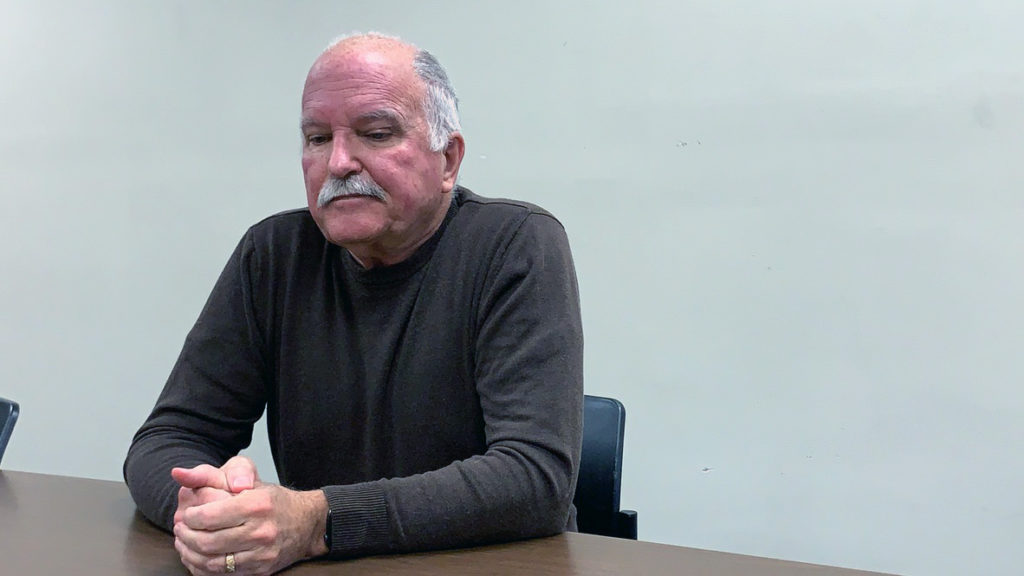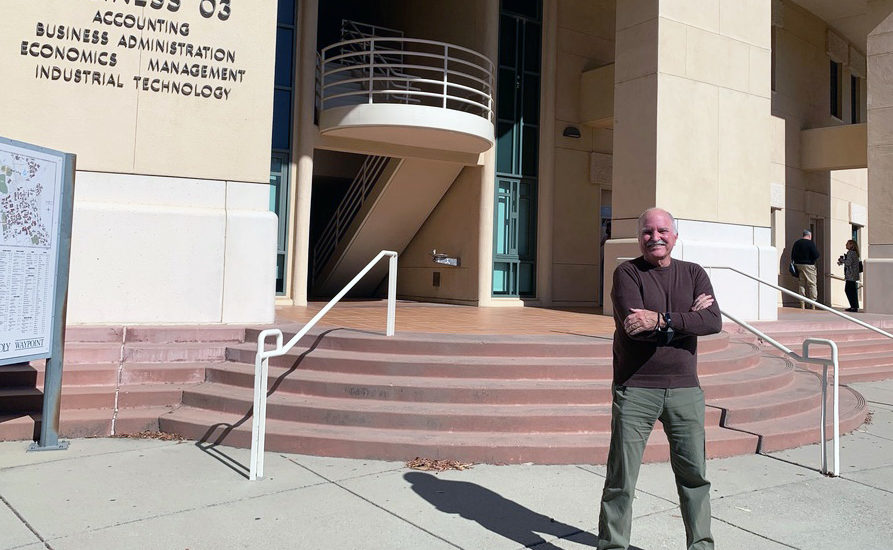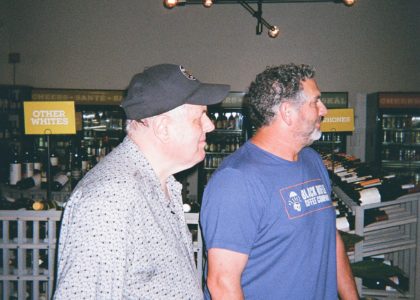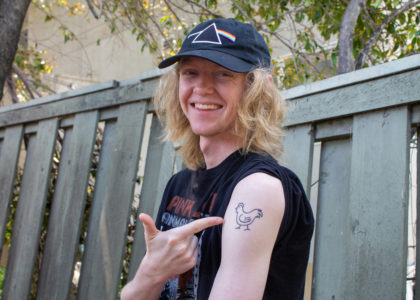By Jorja Murphy and Jennie Le
Cal Poly lecturer Cal Stevens discovered the Shades of Cal Poly Instagram account after several students reported positive interactions with him. The account was not one that Stevens followed closely, but months later, when he received the notification that alerted him of Shades of Cal Poly’s activity, he decided to start scrolling through the account’s posts.
He was surprised to see a more recent mention of his name — a negative one — tied to a personal anecdote that he had shared in one of his classes. A student had accused him of making racist remarks.
Initially, he thought the student had simply misunderstood the context of his remark, which was about confronting his own biases.
“And then, as I thought about it more, I thought, oh, wait a minute,” he said. “This is the part of it that was my fault.”
Coming across that post prompted Stevens to revisit the day and consider what he might have done differently, he said.
A team of Cal Poly students anonymously created Shades of Cal Poly, meaning that both the student submissions and account administrators remain nameless. The account allows students to share their experiences of feeling discriminated against on campus.
Since it launched in 2020, the unnamed Shades of Cal Poly team have posted over 870 accusations about experiences and specific people. Most are general, but some include specific names.
Those named accusations have led some community members to weigh the benefits of the forum against the ethics of anonymous accusations.
What is Shades of Cal Poly?
Shades was created in July of 2020, in the aftermath of George Floyd’s murder and a national reckoning with systemic racism. Almost two years later, the account now features over 800 posts detailing various accusations of discrimination and sexual assault within the Cal Poly community.
According to the founders in a previous interview, anonymity allows victims to speak up against those in power without fear of legal or disciplinary repercussions. However, because all accusations are anonymous, they cannot be verified.
Because the posts cannot be factually verified, the account owner(s) only include the names of university staff, faculty and administration — not the names of students, according to a previous Mustang News interview.
“Since the professors and many organizations maintain a position of power on campus … we find it imperative to allow the submissions to name them so that professors who have been named many times can be identified,” Shades of Cal Poly said in a previous interview with Mustang News.
But what has happened to staff, faculty and administration after being called out on the Instagram account?
- Shades of Opinions
After seeing the Shades post about himself, Stevens recalled the day when he told his class a personal anecdote about a day many years before when he saw a person of color with a hoodie on a walk in front of his house.
His first thought was: “What is that person doing in my community?”
His intention was to use this anecdote to demonstrate his journey of personal growth toward dismantling his generational prejudices. Stevens says the story was meant to be an example of providing a model of reflection, confession, repentance and personal change.
“I apologize for my remarks that made anyone uncomfortable or unsafe,” Stevens said in a comment on the post. “I confess dark things so as to be rid of them, to let the light of day evaporate the unconscious biases that need to be corrected. I’ve done a lot of internal work to undo these things.”
Stevens said he did not feel angry or threatened by the “call out” on Shades of Cal Poly. Instead, he used it as a lesson that taught him about the risks of complete transparency.
“Sometimes transparency is a good thing, and sometimes it’s a risk that carries certain costs,” Stevens said. “There’s a cost that I apologize for, and that cost was that in the interest of talking about a former self, just that image made someone feel uncomfortable.”
The same lesson could be taught in a less personal manner, he acknowledged. Though it may not have the same impact and relevance without the personal anecdote, it would spare the risk of discomfort for every student sitting in his class.
Overall, Stevens said he remains supportive of the forum that Shades of Cal Poly has created for students in the community.
“It has a goodness on the inside, but I just think we have to be wary of its power and be able to handle things rightly,” Stevens said. “I wouldn’t want to undo what Shades of Cal Poly has provided for people in terms of a voice about what’s going on for them, what they care about.”
Statistics department chair Andrew Schaffner offered a different perspective. While he said he recognizes that Shades of Cal Poly can be used as a place for victims to vent, he believes that talking to an authority figure is a better way to seek change.
“If there is a problem with a faculty member, the best way to handle it is to come to a department chair because then we are certain it will be seen and handled,” Schaffner said. “Posting it on an anonymous forum, things may or may not get addressed.”
Schaffner said anonymous forums are potentially more dangerous than they are useful, since the poster and their motives are unknown.
“Folks need to understand that even though they might feel that they’re posting in a vacuum, there is a potential for things to happen when they do post,” Schaffner said. “And if they really mean for things to happen, they should actually just come directly to the appropriate authorities, whether it’s the chair, provost, dean or whoever it is. That’s the right vehicle.”
- The Gray Area
All stories posted on Shades of Cal Poly are submitted to a Google Form and are reviewed by the account administrators. In the form, there is a section that asks students to review their stories before submitting because posts will not be edited, meaning they will not be published if there is profanity, names of students or a major grammar or spelling error, the Shades of Cal Poly team said in a previous interview.
Accounts like Shades of Cal Poly would not be held legally responsible for posts made on the forum as the account’s administrators simply offer the platform for it to be published, according to Michael Park, an assistant journalism professor at Cal Poly and media law scholar.
If someone were to pursue legal action against an anonymous account, the victim could issue a subpoena to the social media platform being used to receive information that will help identify the account owner, Park said.
In the case of Shades of Cal Poly, a subpoena might not be very useful as the account owners do not have access to the identities of those who submit stories anonymously.
The ethics of anonymous posts depends on who is making the accusations, Park said. For example, a journalist who wants to write a story would have to find sources and conduct interviews as it is their professional responsibility to do so. A student writing about their personal experience would not have to do that.
Anonymous posters on Shades of Cal Poly are not “burdened or carrying these kinds of ethics and professional responsibilities,” Park said.
They are not required to do an investigation or interview multiple people to get all the facts.
Although anonymous posters have no code or professional rules to live by, Park said that they have to be careful when posting.
“If you’re saying something that could have a tremendous impact or adverse effect on someone’s life, you should use your words carefully,” Park said.
According to Park, there is the chance that people are not truthful. Since their identity is not revealed, there are no consequences for the accuser.
There can also be instances where posters are telling the truth but sometimes don’t have all the facts, Park said.
“It’s kind of like their opinion. It’s what they saw,” Park said. “Others that are following these platforms have to understand that as well.”
When discussing the pros and cons of the anonymous nature of the account, Park said he views Shades of Cal Poly as a resource that offers a sense of community to marginalized groups.
“People can ask questions, and maybe address issues that they don’t want to talk about publicly when their identity is readily known or apparent,” Park said.
No disciplinary action can be taken solely because of allegations posted on Shades of Cal Poly, according to the director of the Civil Rights and Compliance Office and Title IX coordinator Maren Hufton.
If anonymous posters want action to be taken, Hufton recommends different university resources because Shades of Cal Poly is not an official method of accessing university resources or policies.
According to Hufton,when seeking some form of justice, crimes should be reported to the university police while discrimination, harassment, retaliation and sexual misconduct instances should be reported to the Civil Rights and Compliance Office.
“A survivor is always in the driver’s seat in terms of what they need and what they want. And so if it’s sharing out, then perhaps there are forums for that that are available,” Hufton said.
When accusations are anonymous, it prevents Hufton’s ability to address or respond to reports as she is limited by the sufficiency of the information given.
“If I don’t have a complaining person to speak with,” Hufton said, “that’s a significant impediment to the sufficiency of information to move forward.”

- Shades of Students
Through an anonymous survey from Mustang News, students who said they had submitted to Shades of Cal Poly shared their perspectives.
“It did not feel entirely gratifying, but better than not sharing the truth, which is commonplace and a reality for most Cal Poly students,” one student said.
“I do not think the administrators of the group are very receptive to feedback from the public. I do not think that the people in charge of the group are very clear with their objective and fulfilling said objective to enact change and praxis,” another student said.
Another student had submitted a story to the account about their experience.
They said they supported Shades of Cal Poly at first, but came to feel uncomfortable with the account’s lack of content warnings and their reasons for not including it in their posts.
“They claim to be in support of survivors but refuse to do what survivors are asking them to do, which I find to be extremely performative,” the student said. “Additionally, all the allegations of sexual assault on that page against fraternities has amounted to nothing, so it feels useless. But, I think having a platform for students to share their stories is good and makes our experiences a bit harder to ignore.”
The account administrators for Shades of Cal Poly declined to comment for this story.
Featured image by Jorja Murphy and Jennie Le






